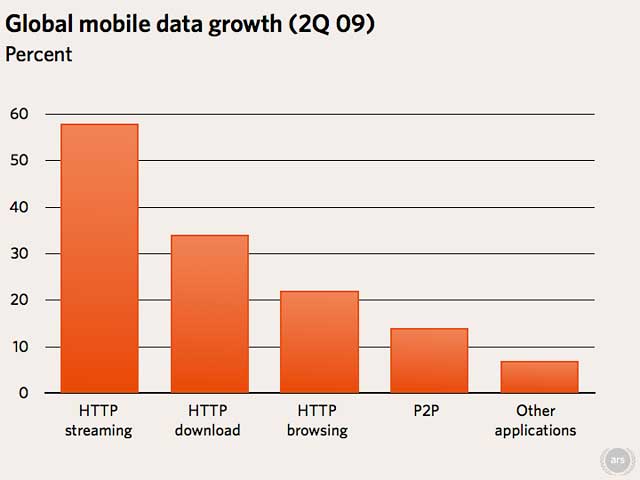Tremendous sales of both smartphones and laptop data cards mean tremendous data surging through cell networks, and a new report says that mobile data growth grew 30 percent over the course of the second quarter 2009. But (for once) don't blame P2P.
Allot, a vendor deep packet inspection (DPI) and other network monitoring gear, has just released its Global Mobile Broadband Traffic Report for Q2 2009, using data gathered from wireless network operators. It found that the most popular use for mobile data is HTTP browsing, though HTTP streaming is by far the fastest-growing (58 percent over the quarter).

HTTP downloads of all kinds (including one-click download sites like RapidShare) are also popular, and already account for more mobile bandwidth utilization than P2P file-sharing.
But P2P does affect mobile networks. Though it only accounts for 21 percent of the bandwidth utilization in an average mobile cell, it takes up a 42 percent of the bandwidth in the top five percent of utilized cells. In other words, when you look at the cells which experience the most issues with congestion, P2P is one of the prime culprits. When combined with HTTP downloads, 64 percent of the bandwidth in the busiest cells is being used to grab files (compared to 45 percent in the average cell).
According to the report, "What is most noticeable from the data gathered in this report is that subscribers are treating their mobile networks much the same as they treat their fixed networks. This is particularly true for heavy data users who seem to expect the same service from the Internet, irrespective of their access method."
This certainly seems true of mobile data cards in particular. Now that mobile data speeds routinely hit 800Kbps-1Mbps, a good connection means that streaming video on sites like Hulu works well enough not to make users want to gouge their eyes out. And once it works, why not use it? Cell congestion may be a problem for carriers, but it's not the first thing on the mind of road warriors watching an episode of House at the hotel in the evening.
reader comments
18